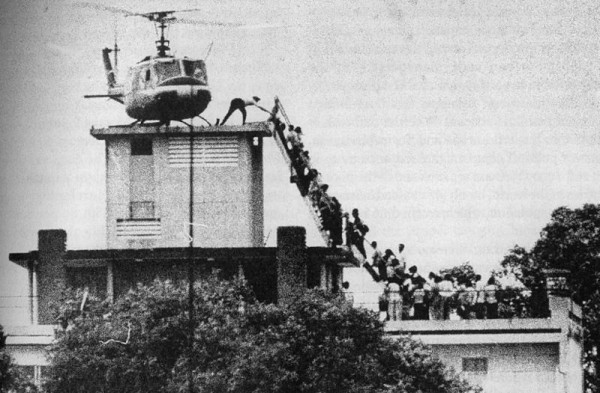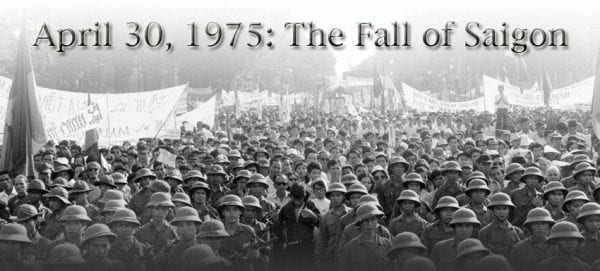US Wars: Defining Victory
STEVEN JONAS MD, MPH, Senior Editor
The Vietnam War was a US victory. The peaceful establishment of socialism was prevented. The country was devastated…as an example for those who might dream of defying the malignant empire.

Were wars since Vietnam won or lost by the US? The answer to those questions may not appear to be the obvious ones. If the unspoken government objectives of the various wars are taken into account, indeed they aren’t. Let us start with Vietnam.
The standard interpretation of the US War on Vietnam is that the US lost it. The classic picture is of that last helicopter taking off from the roof of the soon-to-be former US Embassy in Saigon. But if one considers the original US objectives of the intervention-to-become-war in Southeast Asia, it was actually a win.
The French-Vietnamese War ended in 1954. The Geneva Conference of that year produced a treaty signed by the French and the Vietnamese and guaranteed by Great Britain and the Soviet Union. It brought hostilities to an end, temporarily divided the country in two, and provided for national elections to be held in 1956 — elections that everyone knew would be won by Ho Chi Minh and his people. Pointedly, the US refused to sign or recognize the treaty.
They knew that if the plan in it were allowed to proceed, the chances were very good that Vietnam would peacefully progress to socialism and could be an economic success. If that happened, the same thing might well peacefully occur in other Southeast Asian countries, were democracy to be given a chance. Even as certain US analysts attempt in hindsight to disavow it, the “domino theory” about the spread of “socialism with a national face,” distinguished from and not necessarily allied with the Soviet Union, and certainly not with the traditional enemy, China, communist or not, was quite correct.

And so, in the view of the US leadership of the time, the Dulles Brothers, John Foster at State and Allen at the CIA, everything had to be done that could be done to prevent the democratic process from introducing socialism to a country and then possibly succeeding in a peaceful setting. Once started, the process just continued on its own momentum, especially since any opponent of the war was labelled a “commie sympathizer” or worse by its supporters.
If looked at in this light, the Vietnam War was a US victory. The peaceful establishment of socialism was prevented. Its spread by example and peaceful means to neighbouring countries was prevented. Vietnam today has a sort of market socialist economy, becoming more “market” and less “socialist” by the year. But the country was ravaged by almost 20 years of war and two to three million of the best and the brightest of its people were killed. It is hardly the economic or social engine of the development of democratically-installed socialism that it might have become had it been left alone. In terms of the original American goals for the intervention, this was a win, a palpable win.
Next, let’s consider the various interventions in the former Yugoslavia. Certainly lives were saved and a good deal of stability was eventually established, in Bosnia and Kosovo. But they do not fall under the usual rubric of “victory.” In terms of the promotion of US imperialism around the world, however, “victory” was achieved. The US showed, for example, that it could bomb the capital of another sovereign nation for 70 or so days straight, without UN sanction, and no one with any authority could say boo to a goose. In terms of international law, it was sort of like the Japanese invasion of Manchuria, the Italian invasions of Libya and Ethiopia, and the German-Austrian Anschluss. In terms of Kosovo, the US showed that a piece of a sovereign country, in this case Serbia, could be split off from it and made into an independent country, again without UN sanction. (Ukraine/Crimea, anyone?) And the US has a quite large permanent military base in Kosovo—Camp Bondsteel. Spoils of war?
And then we come to Iraq. It is now teetering on the brink of even more disaster than it has been subject to since the US invasion, and political figures like “Negative Ace” McCain are now shouting that the US should have stayed there, and it’s “all Obama’s fault.” As I said in a recent Tweet, “Blaming Obama for Iraq tragedy is like blaming the sweepers for the elephant droppings needing clean up after the circus parade has passed.” (Yes, and the “elephants” were purposely chosen.) This is so even though George Bush could not negotiate a Status of Forces Agreement with his hand-picked Prime Minister, al-Maliki, to exempt US troops and civilian contractors from local law in the case of violations of it, and that Obama has just lost it by the pull-out. (That’s an excellent, in-depth column by Dexter Filkins, by the way.) If Iraq falls into civil war or is split up into three parts (which Joe Biden and I must say myself both suggested shortly after the beginning of hostilities), many voices will indeed be shouting “loss.” But once again, in terms of the original objectives, it was not.
First of all, one of its original major justifications, other than the non-existent WMD, was that the War on Iraq was a part of the “War on Terror” (which is still going on). One should note (and I must note that I have done so on a number of occasions) that, according to one retired Army General, to call a military action a “War on Terror” is akin to calling another action a “War on Flanking Manoeuvres.” “Terror,” however you want to define it, is a tactic used by an enemy. It is not itself an enemy. But it was very much in the interests of those forces [inside America] which forced the US into war to cement the “terror/fear” environment in the minds of the US people. And they certainly have achieved that goal, within the GOP/TP “base,” at least.
Second of all, sometime after the Iraq invasion began, it started to become clear that the primary objective was not at the beginning what many of us on the Left thought it was: “oil and bases” – and it was to a degree. However, there was a goal that was probably more compelling to the neocons, although not mutually exclusive.
On the surface, the CheneyBush War Policy was becoming curiouser and curiouser. “Things are getting better in Iraq,” they said, when they were clearly getting worse. “We must fight on to ‘victory’ ” they said, without ever defining what they mean by “victory.” And “we must fight on to ‘victory'” when virtually every other military and political authority on the matter said that no matter how you would define it, “victory” was impossible. But that would be “victory” in military terms.
However, let’s connect the dots to see what was really happening. 1. As is very well known, Bush/Cheney lied the U.S. into war. 2. There was no post-war planning, as is also well known. The U.S. State Department had a plan, and all 2,200 pages of it were just ignored. 3. The museums looting that could easily have been prevented could have part of a plan (well a different kind of plan) to develop permanent chaos. That would also explain the staffing of Paul Bremer’s pro-consulate by totally unqualified, very young, Republican political operatives: not accidental or careless, but purposeful. In essence it was thinking what might be stated like this: “Let’s do whatever we can to gum up the infrastructure even further than it is already gummed up by Saddam and our invasion.” 4. In late 2006, the report of The Iraq Study Group, headed by no less than the man who coordinated the effort to steal the 2000 election for Bush, James Baker, had provided a perfect cover for withdrawal to begin then. CheneyBush disposed of it before the ink was dry, and [the famous/infamous “Surge” was begun. 5. At various times, the major Muslim countries offered to provide cover for an American departure, especially if it were attached to a real settlement of the Palestine/Israel problem. They were not taken up on those offers.
In the 2008 Presidential campaign, John McCain at one time rattled on about “staying in Iraq for 50 years.” (Gosh. Some things never change, changing conditions to the contrary notwithstanding). Indeed, the US eventually left Iraq, not with any kind of “victory” but because it was pushed out, by the very puppet government that Bush/Cheney set up. But the Permanent War Society, or at least the Permanent Preparation for Permanent War Society, is very much in play. In terms of its original objectives, regardless of what happens in the Middle East now, the War on Iraq can only be said to have resulted in a victory – for those who originally planned and prosecuted it.
As for Afghanistan, that may be the one major war the US has fought since World War II that could not be said to be, in any sense of the term, a “victory.” But that one’s for another time.
—————————————————————————————————–
ABOUT THE AUTHOR
Senior Contributing Editor Steven Jonas, MD, MPH is a Professor Emeritus of Preventive Medicine at Stony Brook University (NY) and author/co-author/editor/co-editor of over 30 books. In addition to being a contributor to The Greanville Post, he is a columnist for BuzzFlash@Truthout and the Editorial Director of and a Contributing Author to The Political Junkies for Progressive Democracy. Dr. Jonas’ latest book is The 15% Solution: How the Republican Religious Right Took Control of the U.S., 1981-2022: A futuristic Novel, Brewster, NY, Trepper & Katz Impact Books, Punto Press Publishing, 2013, and available on Amazon.